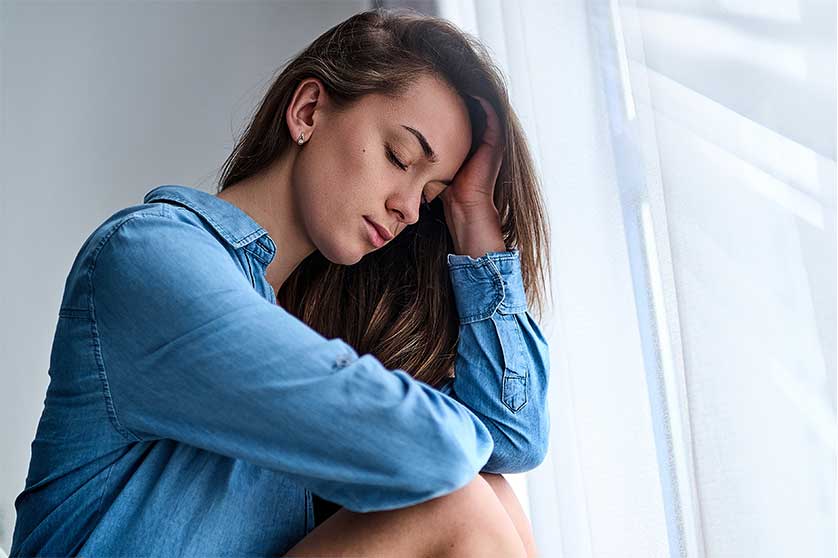Depression (Major Depressive Disorder) Treatment In Ohio

Medically Reviewed By: Manish Mishra, MBBS
In Ohio, major depression is a common, serious, but highly treatable mental health condition. Reach out to Ohio Recovery Center today to receive the support and resources you need to live a positive and healthy life.

We all struggle with periods when we feel empty, insecure, lonely, or lost. But when these emotions, or lack of emotion, become overwhelming and continue for weeks or months at a time it’s important to reach out and get the help we may need.
No matter what type of depression you are struggling with, professional treatment resources can help.
In fact, depression is considered one of the most treatable mental health problems, with between 80% and 90% of patients responding well to depression treatments like talk therapy, counseling, and medication.
Major Depressive Disorder Treatment At Ohio Recovery Center
Ohio Recovery Center is proud to offer primary mental health treatment for major depressive disorder and other depressive disorders at our residential treatment facility.
Our multidisciplinary treatment options include medication, stabilization services, one-on-one psychotherapy, group therapy, cognitive behavioral therapy, and other evidence-based services.
Major Depressive Disorder
Major depressive disorder, clinical depression, or depression can impact your eating, sleeping, work, and relationships. It occurs in children, adolescents, adults, and older adults alike.
Depression may be mild, moderate, or severe. In some cases, those facing severe depression may even feel or come to believe that life isn’t worth living, leading to thoughts of death, suicidal thoughts, or suicide attempts.
Types Of Depression
Subcategories of depression or depressive disorders include:
- persistent depressive disorder (PPD): A condition of mild or moderate depression lasting for at least two years, formerly referred to as dysthymia.
- seasonal depression/seasonal affective disorder (SAD): This involves wintertime and other seasonal symptoms of depression.
- prenatal and postpartum depression: Major depressive episodes that occur during and after pregnancy, respectively.
- atypical depression: Depression involving increased mood reactivity and a variety of other less-common features.
- treatment-resistant depression: major depression that does not respond to standard treatment practices.
- depression related to substance use disorder, bipolar disorder, schizophrenia, anxiety disorders, and a wide variety of other physical or mental illnesses
Signs Of Depression
Telltale signs and symptoms of depression include:
- profound and lasting depressed mood
- lack of energy and motivation
- feelings of worthlessness
- thoughts of death or self-harm
- eating changes and weight gain or weight loss
- sleep changes and sleeping too much or too little
- loss of interest in hobbies and passions
- headache, pain, sexual dysfunction, and other physical symptoms
- difficulty with concentration and decision making
Diagnosis
According to the DSM-5, depression is a mood disorder diagnosed through persistent sadness and a profound loss of interest and/or self-esteem on most days for at least two weeks.
Risk Factors
Risk factors for depression can include:
- genetic factors/family history
- traumatic or stressful life events
- chronic pain/other serious health conditions
- substance use
Depression Statistics
According to research from the Health Policy Institute of Ohio, the rate of depression in Ohio in 2022 was 22%, just over the national rate of 20.5%.
However, Ohio’s young adults (ages 18 to 24) are the age group with the highest level of diagnosed depression overall at 29.5%.
Treating Depression
Mental health professionals have developed different treatment options to address depression in its various forms.
Medication
Antidepressant medications, or mood stabilizers, work to rebalance the brain’s neurotransmitter to promote an improved sense of positivity and wellbeing.
FDA-approved antidepressants include:
- selective serotonin reuptake inhibitors (SSRIs), including fluoxetine (Prozac), paroxetine (Paxil), sertraline (Zoloft), citalopram (Celexa), and escitalopram (Lexapro)
- serotonin/norepinephrine reuptake inhibitors (SNRIs), including duloxetine (Cymbalta), venlafaxine (Effexor XR), desvenlafaxine (Pristiq), and levomilnacipran (Fetzima)
- atypical antidepressants, including trazodone, mirtazapine (Remeron), vortioxetine (Trintellix), vilazodone (Viibryd), and bupropion
Tricyclic antidepressants (TCAs) and monoamine oxidase inhibitors (MAOIs) may also be prescribed as second-line options, though these medications come with a higher risk of side effects.
Psychotherapy
Cognitive therapy, interpersonal therapy, psychodynamic therapy, family therapy, and other forms of individual or group therapy and counseling can help those with depression.
These therapies help patients understand their condition and develop new strategies to manage stress, counter negative thought patterns, and connect with others.
Other Treatment Options
Depending on your situation, you may benefit from more intensive care (including residential psychiatric treatment), less intensive care (such as self-guided depression courses or remote therapy sessions), or certain medical procedures like electroconvulsive therapy (ECT) and transcranial magnetic stimulation (TMS).
How To Find Depression Treatment In Ohio
Getting the help you need for depression can make a life-changing difference. Here how to get started:
Reach Out To Local Treatment Providers
You have the option of reaching out directly to therapists and treatment centers for the treatment of depression. These may be local providers near you, or residential centers like Ohio Recovery Center located in Van Wert.
PCP Or Family Physician
Primary care doctors and other healthcare providers you have a relationship with will happily refer you to mental healthcare just as they would for any other medical condition.
SAMHSA
The Substance Abuse and Mental Health Services Administration offers both a helpline and treatment locator tool you can use to locate and connect with approved providers in Ohio and across the country.
If you or your loved ones have been living with untreated depression, or something has happened and you aren’t sure how to cope, please reach out to Ohio Recovery Center today.
- The American Psychiatric Association — What Is Depression? https://www.psychiatry.org/patients-families/depression/what-is-depression
- Health Policy Institute of Ohio — Trends in mental health among Ohioans https://www.healthpolicyohio.org/wp-content/uploads/2022/10/MentalHealth_DataSnapshot_10.20.2022_Final.pdf
- National Institute of Mental Health (NIMH) — Depression https://www.nimh.nih.gov/health/topics/depression

